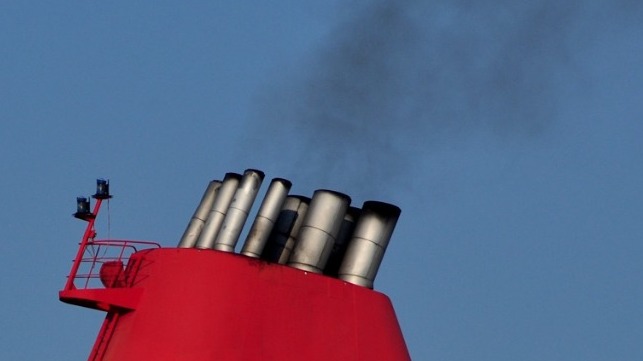IMO Breaks Deadlock on Carbon Pricing for Shipping

The push to decarbonize the commercial shipping industry has achieved a major breakthrough after countries reached a consensus on carbon pricing of shipping emissions, a development that comes after more than 10 years of stalemate.
During a meeting of the International Maritime Organization (IMO) Intersessional Working Group (ISWG) last week, countries reached a consensus on pricing shipping greenhouse gases (GHG) emissions “as part of a basket of mid-term measures (MTM).”
A summary of the meeting’s resolution by consultancy firm University Maritime Advisory Services (UMAS) shows that after more than a decade of resistance, countries have finally managed to reach a consensus for pricing emissions, a major development that would put a cost on carbon emissions as part of the market based measures concept.
The meeting’s outcome is a clear and positive step towards setting the maritime industry on the path to achieving the Paris Agreement goals of keeping global temperatures at below 1.5 degrees Celsius and equitable net zero transition.
“To many, especially in industry, pricing GHG emission has been the obvious next step for a while. It is not a new concept to IMO, but previous attempts to progress it have failed. It is therefore a huge step forwards that there is now consensus on this,” said Dr Tristan Smith, UMAS Director.
He added that although pricing needs to be complemented with a mandatory measure like a fuel standard, there is now a much improved potential for strong IMO incentivization of shipping’s decarbonization.
The consensus on carbon pricing now paves the way for the next step, an agreement on the amount considering that various stakeholders in the shipping industry have put forward different recommendations. The Getting to Zero Coalition, a group of leading maritime companies and environmental NGOs, have called for a carbon pricing of about $200 per tonne of CO2.
The world’s biggest container shipping company, Maersk, has proposed a carbon tax on ship fuel of at least $450 per tonne of fuel, which translates to around $150 per tonne of CO2. The Marshall Islands and Solomon Islands have proposed a carbon price of $100 per tonne while the International Monetary Fund has said the average global carbon price, now at just $2 per tonne, need to reach $75 a tonne by 2030 to meet the Paris Agreement goals.
While the issue of pricing shipping GHG emissions has remained divisive for over a decade, the consensus on the on mid-term measures means the IMO now has a working framework through which to implement policies to drive shipping’s transition and decarbonization.
The UMAS summary show that during the ISWG meeting, countries expressed the high urgency for the adoption of the MTMs, with several countries expressing the need for adoption in 2023 and entry into force by 2025. However, the existing specifications for the timescales and processes of the IMO suggest that entry into force may be 2026 at the earliest.
This is based on the fact that there are a range of policy mechanisms (technical measures like mandates and economic/market-based measures) that must go through further discussion, refinement and prioritization.
The ISWG meeting marked the third substantive discussion on the MTMs with key emphasis being on policies that can drive the shipping sector’s transition away from fossil fuel use. A recurring concern raised by many member states was whether the necessary low and zero carbon fuels will be available in sufficient time and quantity to enable compliance. The concern was particularly expressed by developing countries.
“Growing consensus was achieved around the need for a basket of measures that would combine a technical element with an economic element,” noted Dr Aly Shaw, UMAS Principal Consultant.

that matters most
Get the latest maritime news delivered to your inbox daily.
He added there was also much support for a well-to-wake approach that reduces absolute emissions and puts shipping on a 1.5-aligned pathway with most countries also supporting the need for an equitable transition that would leave none behind.
The commercial shipping industry is one of the biggest polluters accounting for about three percent of global emissions translating to around one billion tonnes of CO2 emissions annually.
